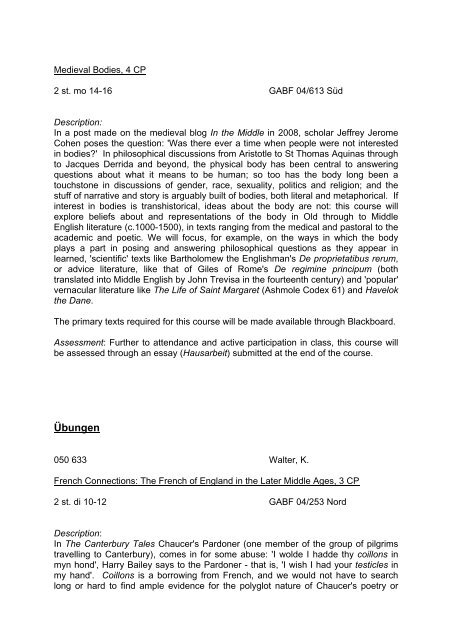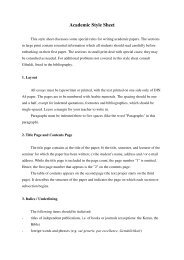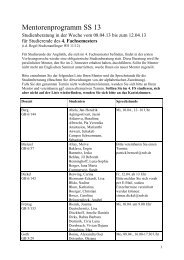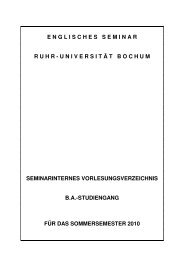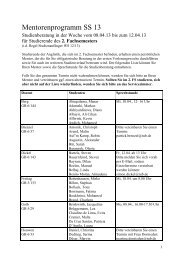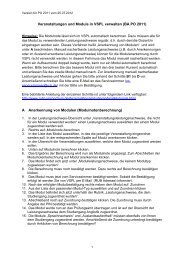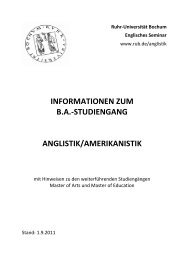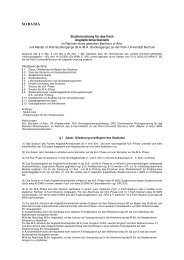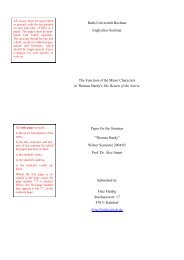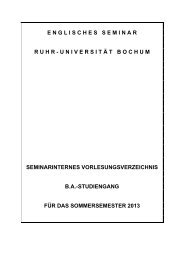universit ä tbochum seminarinternes vorlesungsverzeichnis ba-st
universit ä tbochum seminarinternes vorlesungsverzeichnis ba-st
universit ä tbochum seminarinternes vorlesungsverzeichnis ba-st
You also want an ePaper? Increase the reach of your titles
YUMPU automatically turns print PDFs into web optimized ePapers that Google loves.
Medieval Bodies, 4 CP<br />
2 <strong>st</strong>. mo 14-16 GABF 04/613 Süd<br />
Description:<br />
In a po<strong>st</strong> made on the medieval blog In the Middle in 2008, scholar Jeffrey Jerome<br />
Cohen poses the que<strong>st</strong>ion: 'Was there ever a time when people were not intere<strong>st</strong>ed<br />
in bodies?' In philosophical discussions from Ari<strong>st</strong>otle to St Thomas Aquinas through<br />
to Jacques Derrida and beyond, the physical body has been central to answering<br />
que<strong>st</strong>ions about what it means to be human; so too has the body long been a<br />
touch<strong>st</strong>one in discussions of gender, race, sexuality, politics and religion; and the<br />
<strong>st</strong>uff of narrative and <strong>st</strong>ory is arguably built of bodies, both literal and metaphorical. If<br />
intere<strong>st</strong> in bodies is transhi<strong>st</strong>orical, ideas about the body are not: this course will<br />
explore beliefs about and representations of the body in Old through to Middle<br />
English literature (c.1000-1500), in texts ranging from the medical and pa<strong>st</strong>oral to the<br />
academic and poetic. We will focus, for example, on the ways in which the body<br />
plays a part in posing and answering philosophical que<strong>st</strong>ions as they appear in<br />
learned, 'scientific' texts like Bartholomew the Englishman's De proprietatibus rerum,<br />
or advice literature, like that of Giles of Rome's De regimine principum (both<br />
translated into Middle English by John Trevisa in the fourteenth century) and 'popular'<br />
vernacular literature like The Life of Saint Margaret (Ashmole Codex 61) and Havelok<br />
the Dane.<br />
The primary texts required for this course will be made available through Blackboard.<br />
Assessment: Further to attendance and active participation in class, this course will<br />
be assessed through an essay (Hausarbeit) submitted at the end of the course.<br />
Übungen<br />
050 633 Walter, K.<br />
French Connections: The French of England in the Later Middle Ages, 3 CP<br />
2 <strong>st</strong>. di 10-12 GABF 04/253 Nord<br />
Description:<br />
In The Canterbury Tales Chaucer's Pardoner (one member of the group of pilgrims<br />
travelling to Canterbury), comes in for some abuse: 'I wolde I hadde thy coillons in<br />
myn hond', Harry Bailey says to the Pardoner - that is, 'I wish I had your te<strong>st</strong>icles in<br />
my hand'. Coillons is a borrowing from French, and we would not have to search<br />
long or hard to find ample evidence for the polyglot nature of Chaucer's poetry or


